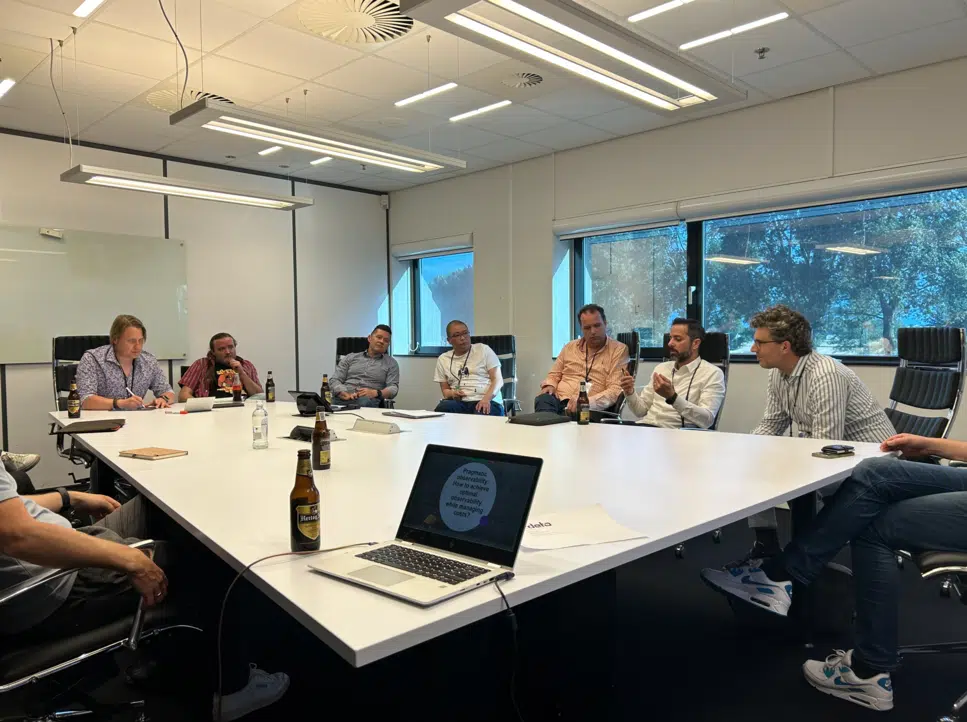Talent acquisition is evolving…
Driven by advancements in technology, and changing social and political trends, businesses are now having to think about how to source and attract their candidates differently.
In our Talent Leaders Q&A Series, we recently spoke to Ben Gledhill, Head of Resourcing at Yodel, about where these changes will take us in the future, and how businesses can navigate this rapidly changing landscape to source, attract and hire the top talent.
Third Republic (TR): What is your biggest hiring challenge at the moment?
Ben Gledhill (BG): For years there have been two strands of hiring; the sourcing of candidates and the actual hiring, or recruiting, of them. It’s not that difficult to actually source people; with the increase in technology there are numerous ways to find people and get their information. The difficult part is engaging these candidates.
Whether it’s through marketing or social efforts, businesses are having to think cleverly in how they try and engage individuals. So, whilst technology is helping us to source people, getting someone to listen to your pitch and to what you can offer is becoming increasingly difficult.
TR: How do you think talent acquisition has changed in this increasingly digital age?
BG: When I started working 12 years ago we had an early version of LinkedIn, which no one truly understood, and then there were job boards. Now, everything is digital first. This means that people have an expectation that you will deal with them online and from a digital perspective. Whether it’s Skype interviews or accepting an offer online, there is an expectation that the talent acquisition process will be digital.
The flip side of this is that recruiters have seen, and will increasingly see, technology playing a huge part in their processes. Things like chatbots and automated AI sourcing tools will quickly become the norm. For instance, there’s now software which scores a video interview using AI and machine learning to determine if the candidate has passed.
Technology is, and will continue to completely revolutionise how we are hiring. Will there be parts of the hiring system that, in 10-15 years, will completely be done by AI and automation? Absolutely, it is inevitable. I don’t think the recruitment industry is specialist enough to escape the move towards technology.
TR: Do you think candidates have changed how they are looking for work?
BG: If you look at people born in the past 15 to 20 years, they have grown up with tech and social, and they now expect everything to be done online, and businesses have to make this change as a result.
At the same time, organisations are going to have to be careful not to alienate other generations who aren’t as technologically native, such as Generation X or Babyboomers. Companies are still going to have to think about, and cater for, all these demographics when thinking about how candidates look for work. It would be quite naïve to say that absolutely everything is going to be moving digital, and towards the likes of Facebook and LinkedIn.
TR: Have you altered your talent sourcing methods as a result of these changes in behaviour?
BG: Yes, massively. Whereas we used to take a very traditional, blanket approach, we are now being very targeted – looking at our personas and where their media habits are.
We have taken a consumer first approach in our strategy to sourcing. We now understand our user and audience base, and focus on getting in front of them on the channels they are most likely to already be using.
We have also shifted towards more conventional marketing methods like inbound and content, and have focused on ensuring our brand is out there before we even advertise vacancies, so that when we do people know who we are and what we offer.
TR: So clearly, as employer branding becomes more important, recruitment and marketing have started to overlap. What do you think about this phenomenon?
BG: I think we’re going to see a merging of brands. Corporate, consumer and employer brands will all blend into one so that when someone experiences one aspect of a brand, it will automatically foreshadow the reputation of the entire brand. For instance, in recruitment a candidate might have a bad experience in their process, and they will refuse to use the store or the service – the consumer brand has been damaged by the employer brand.
We saw this when I was Head of Talent Acquisition at Sofology; we had candidates who did not enjoy our process and their feedback was that they wouldn’t use our stores. We also had candidates who had a good experience and begun to use our stores, so it can work both ways.
TR: What trends do you think we are seeing in talent acquisition?
BG: I think there are three key ones. Firstly, Brexit will have a major impact over the next few years when it comes to both immediate and future talent. For instance, is it going to affect students coming to the UK, or staying in the UK to study and therefore create a further skills gap? The big concern at the moment is that there is no steer coming from the government, so organisations will probably need to look at some rough top-level contingencies for if something happens.
The second trend is the rise of technology. A speaker at an event I recently attended said that in the next 10 years we are going to see as much technological advancement as in the last 150 years. This is going to have a huge social impact with people losing their roles to automation, a shift in populations and a change in general social opinion.
Finally, I think we are seeing a trend of resourcers starting to engage and look at different talent pools. Diversity and inclusion is big for me, and something that I don’t think companies do enough. We also need to be focusing on people returning to work and looking more at development in terms of how organisations mould people and grow their role.
There is going to be a further shortage of skills in the 2 to 5 years with what is happening socially and politically, so organisations are going to have to expand their searches and follow these trends closely, particularly the social ones, to keep up.
TR: You mention there being an expected skills gap; do you think we are currently experiencing one in tech?
BG: Oh, massively. My current role is in Liverpool, but I have been in and out of Manchester which is considered the digital hub of the North. Even here, the skills just don’t exist – whether it’s Java, .Net or PHP skilled candidates are difficult to come by. Those with the skills are moving to London or Germany because they know they can do better, and charge more for their time there. For instance, in my current role I am looking for Java developers, and unless you want to get into a bidding role, it’s typically difficult to source the skilled candidates we need.
I think we will slowly see a move towards the likes of modern apprenticeships and training schemes, because whilst universities focus on academics they aren’t providing the tangible skills, like coding, that we need to increase the level of technically-skilled candidates leaving university.
TR: What do you think of recruitment agencies?
BG: I think they come in two categories; those that are awful, and those that are very skilled. The latter lot know their market inside out and I don’t really see them as a recruitment agency, I see them as a partner to my team because they know the industry that well.
I don’t think you can paint all recruiters with the same brush because, even though there are some shockers out there, there are some who are highly respected and worth the fee.
TR: What do you think these skilled recruitment agencies now need to do to distinguish themselves in the saturated marketplace?
BG: The ones that do it really well are the ones who have built up long-term relationships with their clients and candidates. I could easily canvass companies all this week and pick up some vacancies, but unless you have the candidates who trust and listen to you then this is useless.
You have to be able to deliver a shortlist of candidates who are interested and qualified and who can genuinely add value to the business; so to sell yourself it is now all about the trust and relationships you have with candidates.
TR: How do you decide whether or not a recruiter stays on your PSL?
BG: For me it’s about going old school; if you send qualified CVs, book interviews, get offers and fill vacancies then you’re doing your job. What I won’t stand for is when people start playing a game, when they start spec’ing CVs to the hiring managers and trying to jump ahead of the process we have put in place. Hiring managers spend about 2% of their time recruiting, and you’re causing more bother than you’re worth once you start acting like that.
TR: How do you drive value from your agencies?
BG: It’s a tough one because I don’t like to push too much on cost – if you do then you’re just in a race to the bottom and I don’t want to win that race. As long as your agencies are playing the game and sending over qualified, screened candidates who know what we do and who are interested, then I don’t mind paying them market rate. I am wary of people who say they can work at the likes of 10%, because if they’re working at that level something is wrong.
Just as you would happily pay to have the top developer, you need to be willing to pay for the best agencies because they will deliver the value through the candidates they bring to you.
TR: What are the top tips you would give someone who is looking to drive more value from their recruitment suppliers?
BG: First, you have to respect the market. Unless you’re paying silly money, you’re not going to fill your vacancies straight away. It’s way too easy to list your requirements to agencies without respecting what the market is doing and that they’re working in a skills short market.
Secondly, make sure you dig deeper into how your agencies actually do their day job. The ones that do fill a lot of vacancies and have the trust of their candidates will be doing something differently and you should want to find out what that is and how they work to understand if they will really be able to bring you the candidates you need.





